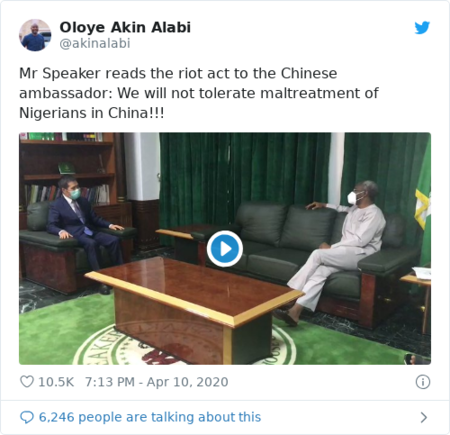
President Trump at the White House on Monday. (Leah Millis/Reuters)
|
Chinese officials and the country’s state-controlled media launched a counteroffensive, aggressively pushing back against foreign criticism while proliferating conspiracy theories that alleged a U.S. origin to the virus. At the same time, Chinese authorities see the pandemic as a vehicle with which to
exercise their fledgling soft power, offering its experience in curtailing the spread of the virus as a model for others and casting itself as a benign global actor eager to come to the rest of the world’s rescue.
But it’s not just the Americans who have their doubts about Beijing’s approach. “It is obvious that such narratives are being worked on,” said German foreign minister Heiko Maas in
an interview with Der Spiegel last week. “But I can only warn against anyone falling for it."
Throughout the world, various governments and politicians have directly challenged China or are now more wary of engagement with its regime.
In some places, nationalist politicos are echoing American grievances. Some officials in India’s ruling BJP party — and their legion of online supporters — have embraced the stigmatizing rhetoric of the “Chinese” or “Wuhan” virus
popular in America’s right-wing media sphere.
As part of his own feuds with rival factions in Rome, Matteo Salvini, the far-right Italian leader, scoffed at Chinese offers of assistance and
accused Chinese authorities of engineering new viruses in their laboratories to spring on the world, a claim that has no evidence. “If the Chinese government knew [about the virus] and didn’t tell it publicly, it committed a crime against humanity,”
Salvini said during a debate last month.
Allies of far-right Brazilian President Jair Bolsonaro — another leader accused of bungling his country’s response to the pandemic — have sought to turn media attention east. “It’s China’s fault,” Eduardo Bolsonaro, one of the president’s sons, tweeted last month, while retweeting a message that said: “The blame for the global coronavirus pandemic has a name and surname: the Chinese Communist Party.”
Last week, Brazil’s education minister Abraham Weintraub, who, unlike some other cabinet-level officials, remains staunchly loyal to the president, warned of Beijing manipulating the crisis to its advantage. “Geopolitically, who will come out stronger from this global crisis?” he wrote in a tweet that was later deleted, which in its original Portuguese replaced the “r” in “Brazil” with an “l” — an apparent mockery of a Chinese accent. “Who in Brazil is allied with this infallible plan for world domination?”
 |
| |
Chinese officials once more protested, aggrieved by Weintraub’s perceived racism. But it is actions in China that have governments in Africa accusing Beijing of xenophobia. Social media was agog over the weekend with footage of
African expatriates living in China’s major cities — particularly Guangzhou, a southern metropolis with possibly the biggest African diaspora in Asia — sleeping on sidewalks or huddled outside the buildings from which they had been arbitrarily evicted by authorities.
An intensifying nationalist climate within China has also led to reports of foreigners, especially Africans, being refused entry at bars and restaurants or forcibly quarantined in their apartments, even if they haven’t traveled anywhere where they would have contracted the virus.
“The Chinese authorities’ actions triggered protests from African governments — an embarrassment for Beijing as it seeks to woo African states with promises of loans and investment — and prompted U.S. diplomats over the weekend to warn African Americans to avoid the Guangzhou area,”
noted my colleague Anna Fifield.




 Of course, the manner in which Russia intervened in U.S. elections in 2016 differed from the role played by bodies such as the National Endowment for Democracy in elections in the former Soviet Union, Neier adds. It is one thing to fund a program for the training of election observers; it is quite another to establish fake social media accounts to disseminate false rumors and smear particular candidates.
Of course, the manner in which Russia intervened in U.S. elections in 2016 differed from the role played by bodies such as the National Endowment for Democracy in elections in the former Soviet Union, Neier adds. It is one thing to fund a program for the training of election observers; it is quite another to establish fake social media accounts to disseminate false rumors and smear particular candidates.